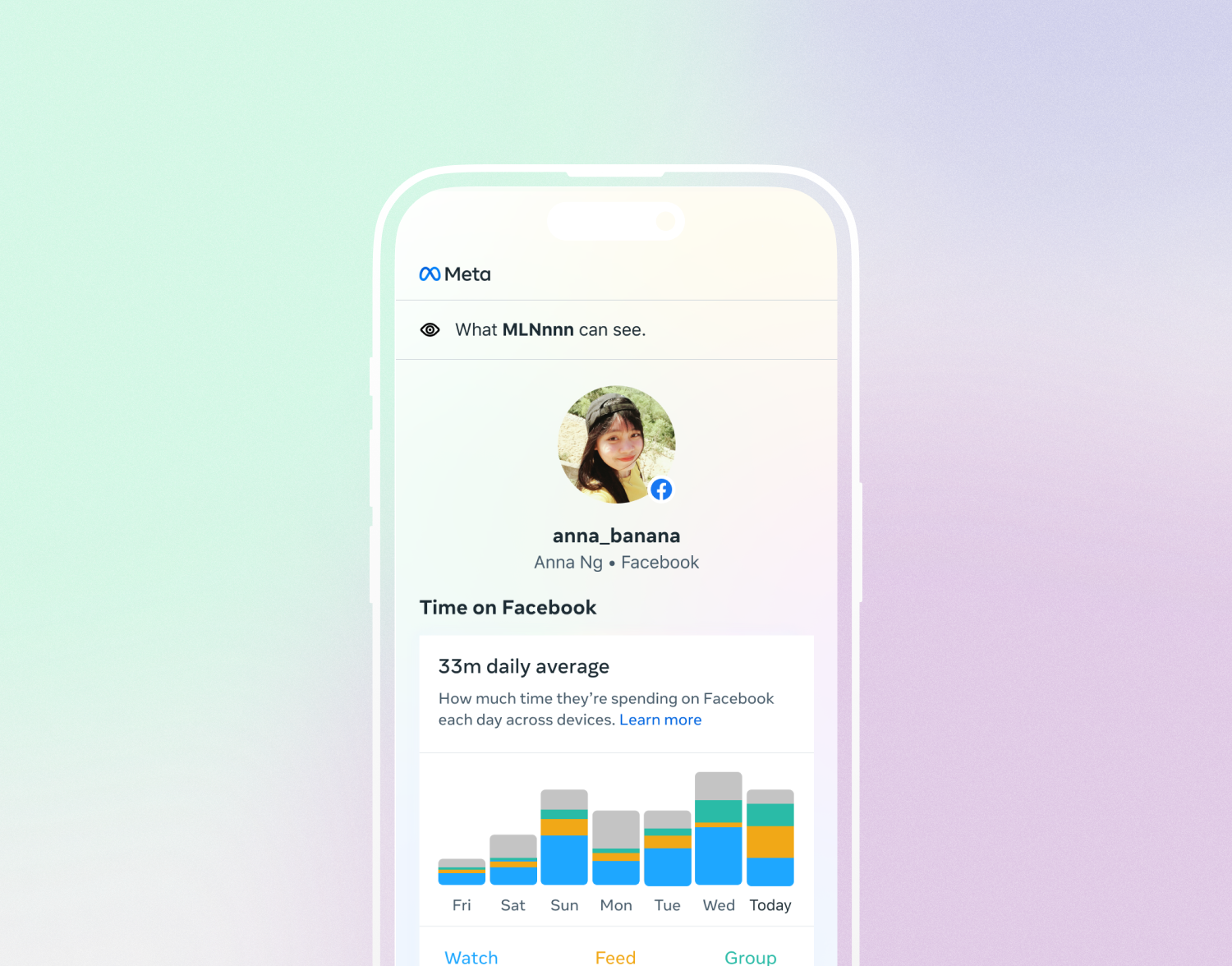
Product design: Facebook Parental Supervision

“There are approximately 10.7M active teens under 18 (5.6% of DAP) and approximately 700K teens sign up for Facebook. ”
61% of sampled US teens reported no or few concerns about their overall use of social media and messaging apps (45% global), despite the prevalence of incidents on certain apps. Meanwhile, 21% of guardians did not allow their teens on Facebook. Facebook was the TOP APP guardian blocked for 5 countries (US, UK, FR, IN, JP) and second for the remaining 2 (BR, ID) out of 21 apps assessed, including Twitter, Instagram, and TikTok. However, 65% of guardians indicated they might allow teens to use social media apps such as Facebook and Instagram if supervision tools were added.
Starting from H2 2023, the Facebook privacy team started to create the Parental supervision experience. It is a set of tools and insights that parents and guardians can use to help support their teens (ages 13-17, or 14-17 in Spain and South Korea). These tools and resources help parents and teens feel safe and informed. Explore our guides, tips and insights to experience Facebook with confidence and peace of mind. Supervision also optional, and both the parent and the teen must agree to participate. It can be removed at any time by either person. The other person will be notified if one of the people removes supervision.
Facebook Supervision is part of the xMeta Privacy experience. Starting from May, 2024, we're making it simpler for parents to see and manage all the teen accounts they supervise across different apps – Instagram, Facebook, Messenger and Meta Quest – in one place via Family Center, instead of having to go into each individual app.
My role
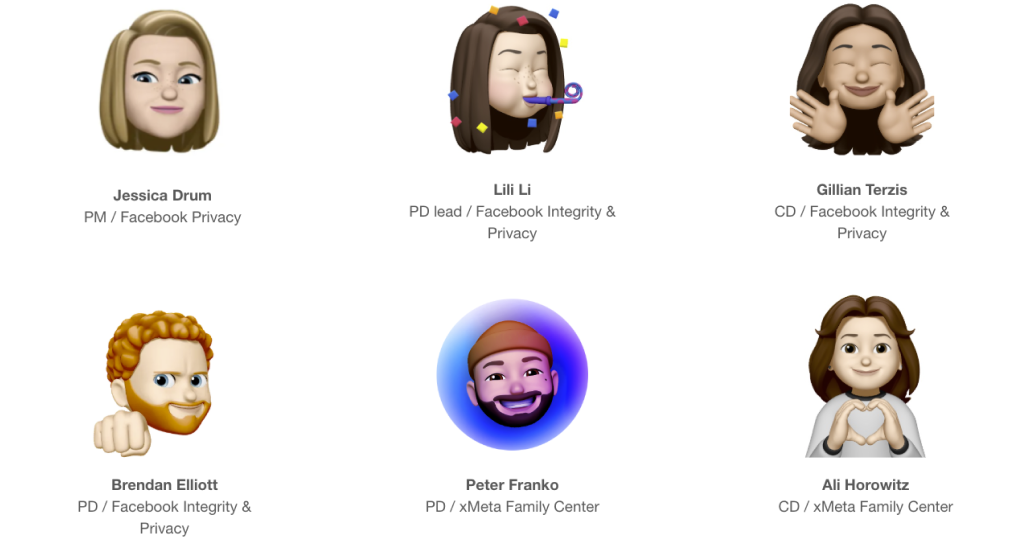
As design lead, I led the design and plan of the Facebook Parental Supervision work stream. Created FB Supervision MVP work. Host 10+ teammates design Sprint across Privacy, Integrity, and CSI. Deep dive into the User Journey and teen's digital behavior. Generated and tested supervision post-MVP design ideas and received valuable user insights that enabled guidance in post-MVP work.
Supervision User flow
Opportunity
1. Adapt to teens as they grow
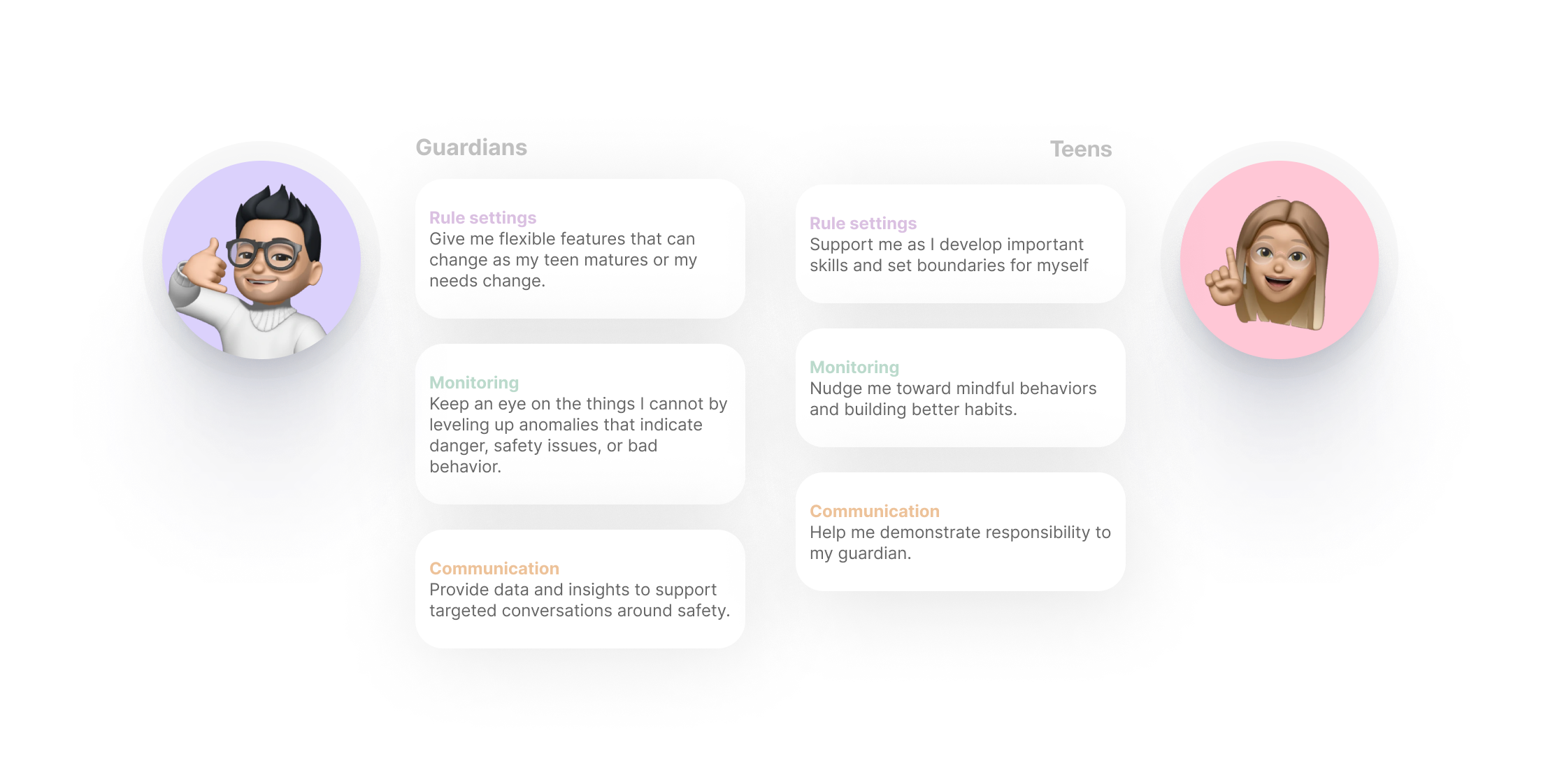
Teens are a diverse user segment whose differences in age and maturity produce distinct privacy needs for digital products. Parents' roles change as teens develop and mature. As teens mature, guardians set fewer limits and move into the phase where they rely more on approaches to supervision that depend on trust and communication. Supporting changing relationships should be an essential part of any support we design. Supervision tools need to add value for both teens and guardians.
What we did:
Family Center is focused on establishing a good product-market fit with early teens and their parents (during a time in which families want to form healthy habits around social media).
We design features to provide value to teens as well as parents (e.g. screen time insights that teens can use to self-monitor, opportunities to revisit and renegotiate controls and insights as teens demonstrate maturity)
We provide flexible tools to guardians that enable them to shift from controls (e.g. screen time limits) to monitoring and conversation over time (e.g. screen time insights)
2.Provide opportunities for safe exploration
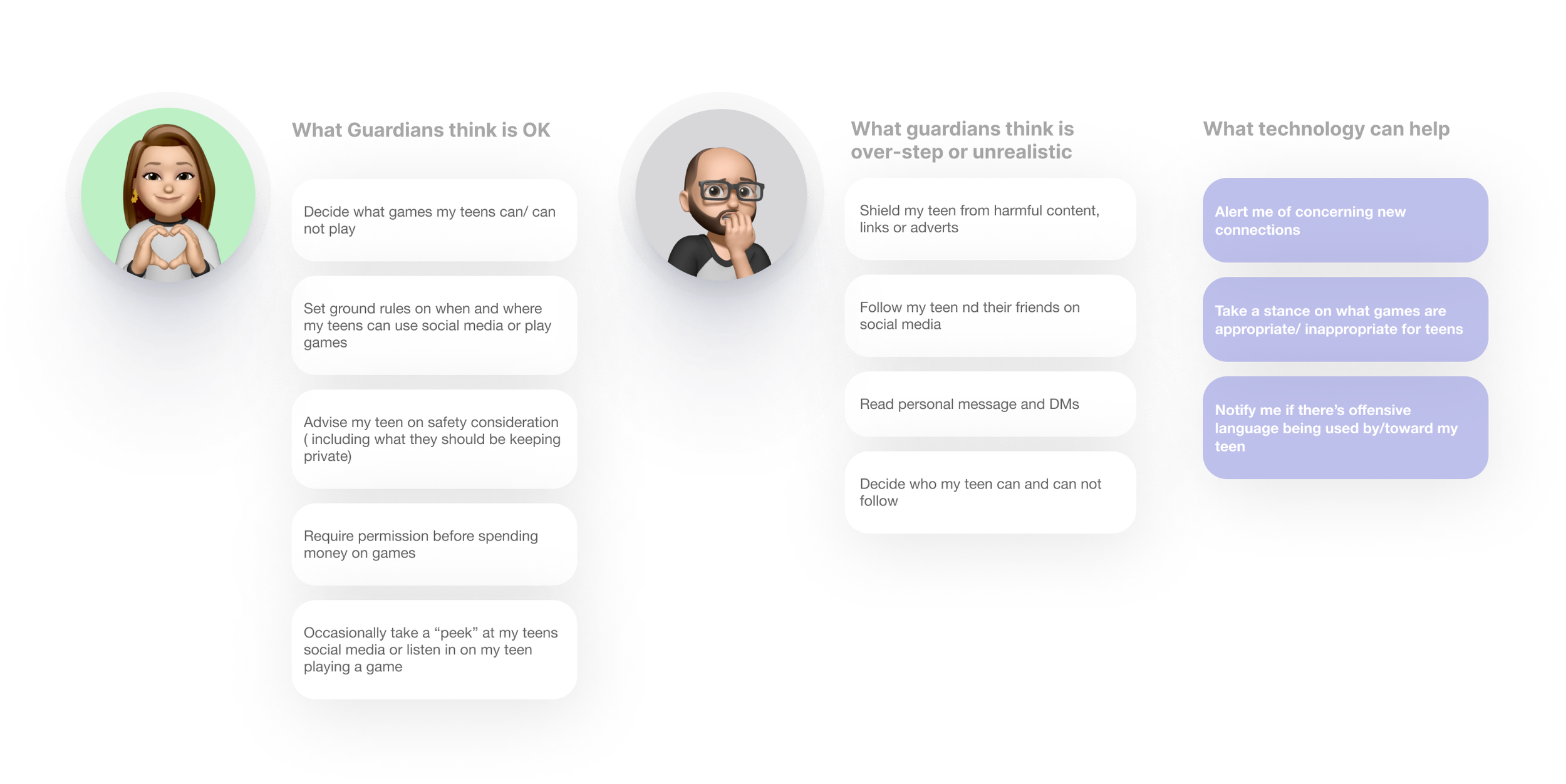
Social media can help teens explore their emerging identities. Teenagehood is a transitional time when teens try on different identities and explore new sides of themselves, including those they fear may be less accepted by their parents and other family members. Social technology provides teens with ways to express themselves in ways that don't feel as vulnerable, whether it is through setting up multiple accounts on social media, posting content that disappears after 24 hours, or creating an avatar that lets them try being someone else. Guardians of teens most often want guardrails that enable safe exploration, and they don't often seek invasive methods of oversight. While cultural differences exist in guardian desires for/teen openness to supervision, teens may reject tools if tools are too invasive.
What we did:
We provide tools for parents to supervise and set limited settings but also allow teens to have a voice. For instance, we require teens to opt into supervision to protect their privacy.
We avoid highly invasive monitoring tactics that might result in teen rejecting supervision (for instance, ability to see messaging content or who their teens are DMing).
We currently avoid showing specific content (e.g., what topics teens search for on IG) to protect teens' need for autonomy and exploration (e.g., of their sexual orientation, political orientation, religious belief).
We allow families to customize their own experiences within limits (e.g., decide on which settings to apply) to account for that they may have unique needs.
3. Support guardians and demystify social media
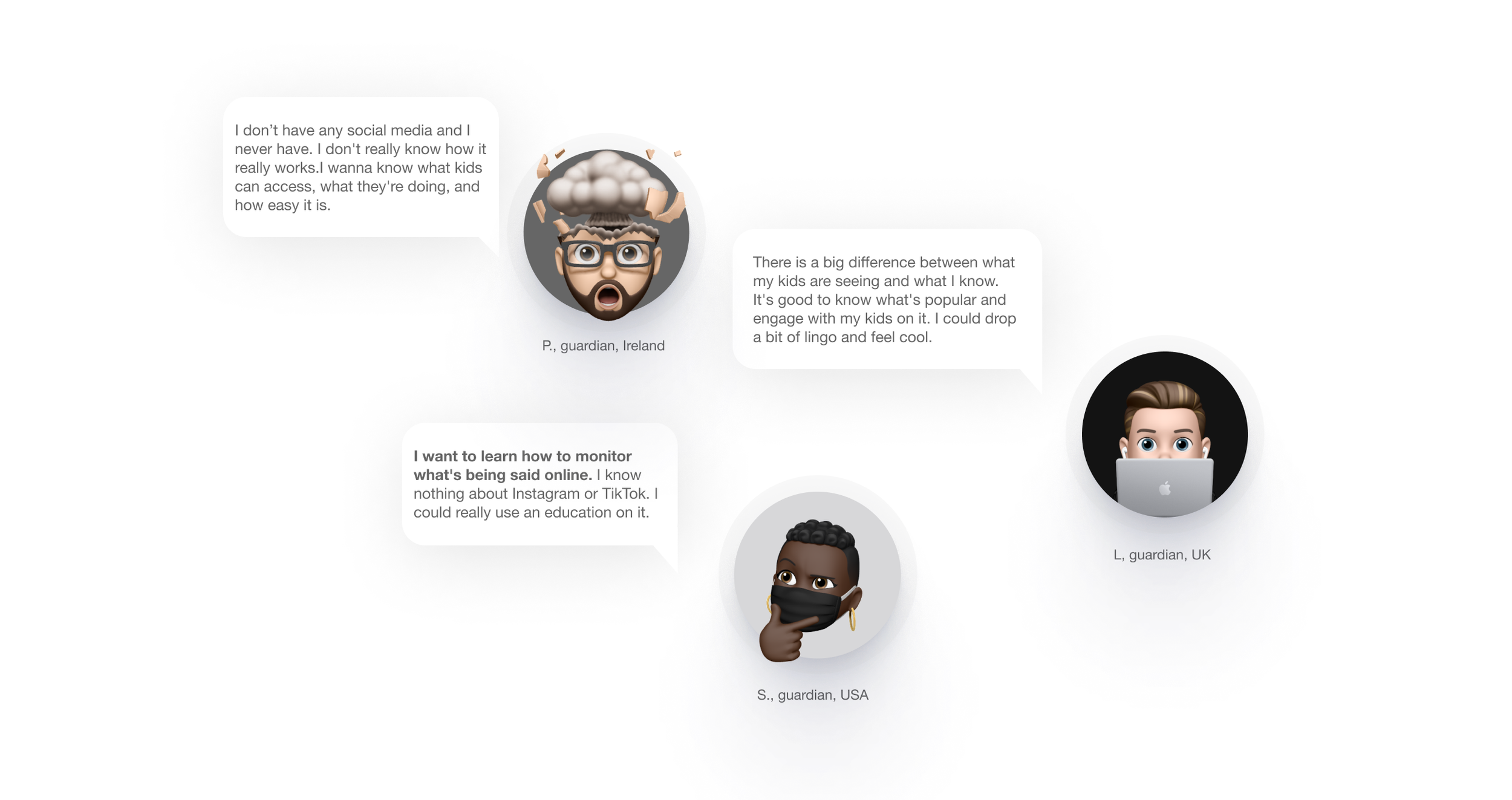
Guardians report having many challenges supervising their teens on social media/messaging apps. Lack of technical knowledge is a barrier to online supervision, also feel like they lack context to understand their teen's online experiences. Guardians across the world feel light years behind their teens when it comes to understanding social media and technology. These guardians wanted the platform to provide easy to understand information about how apps work and what features their teens are using. In survey respondents, less than half of guardians indicated they were very comfortable with navigating technology (e.g. accessing websites, email, etc.)
Guardians feel like they lack context to understand their teen’s online experiences. Even guardians who understand the technical side of social technology lack insight into how their teens' experience may be different from their own. They want resources that help them understand what their teens are up to on social technology and what is trending that they should be aware of. Teens also wish that their guardians could better understand their main concerns on social technology. Often teens are hesitant to talk to their guardians about social tech because they feel that they “just won’t understand.”
What we did:
We keep things simple and don’t add unnecessary features and insights.
We design education and materials in Education Hub to help guardians understand teen POV and experience.
We are building for multiple guardians, to accommodate multiple households configurations and to recognize the reality of digital guardianship
We can’t assume guardians use Facebook and so are exploring allowing supervision from other FOA or in a central place.
We intend to market supervision tools to those we identify might be parents in our FoA (e.g. via QPs) and in the spaces parents visit, such as parent groups.
Longer term, we are considering analog methods of educating guardians about supervision who might not have tech comfort/knowledge.
4. Enhance parent-teen communication
Conversations about social media can be adversarial. When the level of oversight is too high for teens, they often felt like they were not trusted, which can lead to fights. Teen participants were wary of sharing information with guardians in the fear that they might “use the information against them” to get them in trouble or pry on a topic they didn’t want to talk about.
Guardian participants are also mindful of invading their teens privacy but believe they can de-escalate these interactions by having objective “third party” information from an app as a starting point to a conversation.Most teens reported having a positive, trusting relationship with their guardians. The right resources and insights can make conversations around social media more productive. Not all parents/ guardians, however, serve as positive actors.
Most teens reported having a positive, trusting relationship with their guardians. The right resources and insights can make conversations around social media more productive. Not all parents/guardians, however, serve as positive actors. We needs to build for teens who can’t or don’t want to seek help from their guardians by creating a baseline experience that safeguards teens even in the absence of parental supervision.
What we did:
We provide complete transparency to teens as to what guardians can see and do on Family Center.
We rely on insights over settings to facilitate conversation and potentially even teen self-monitoring.
We provide in-context conversation starters and other help to facilitate communication between guardians and teens ( WIP).
We acknowledge supervision is not appropriate or desired for all families and so also build teen support and raise baseline for safety and privacy
Sprint Concepts
Time Spent / P0
Problem: Only showing general screen time information to parents without details is not very helpful for time limits set up.
Opportunity area: - Limits for time spent - Data on where / how someone is spending time
Solution: To assist parents in making better time management decisions with their teens, provide a breakdown of detailed screen time information from teen activity and when it is most used.
Connections / P0
Problem: Parents want visibility into the connections their teen is making on Facebook
Opportunity area: Provide parents with supervision into the connections their teen is making on Facebook
Solution: Create a Connections section with visibility into Friends, Groups, Pages, Events and Pages their teen connects with.
Visibility into Security Settings / P0
Problem: Some teens may be new to the internet and not know best practices around account safety
Opportunity area: Provide parents with insight into the strength of their teens account security measures
Solution: Show strength of password, 2fac, and let parent know when unrecognized device signs in.
Visibility into Privacy Settings / P0
Problem: Some entities on Facebook that a teen would connect with are indicators of identity and interest which a teen may want more privacy over
Opportunity area: Provide a way for teens and parents to balance privacy with supervision
Solution: In the Teen onboarding flow, allow selections of which entities they want to share with their parents with Friends being selected automatically.
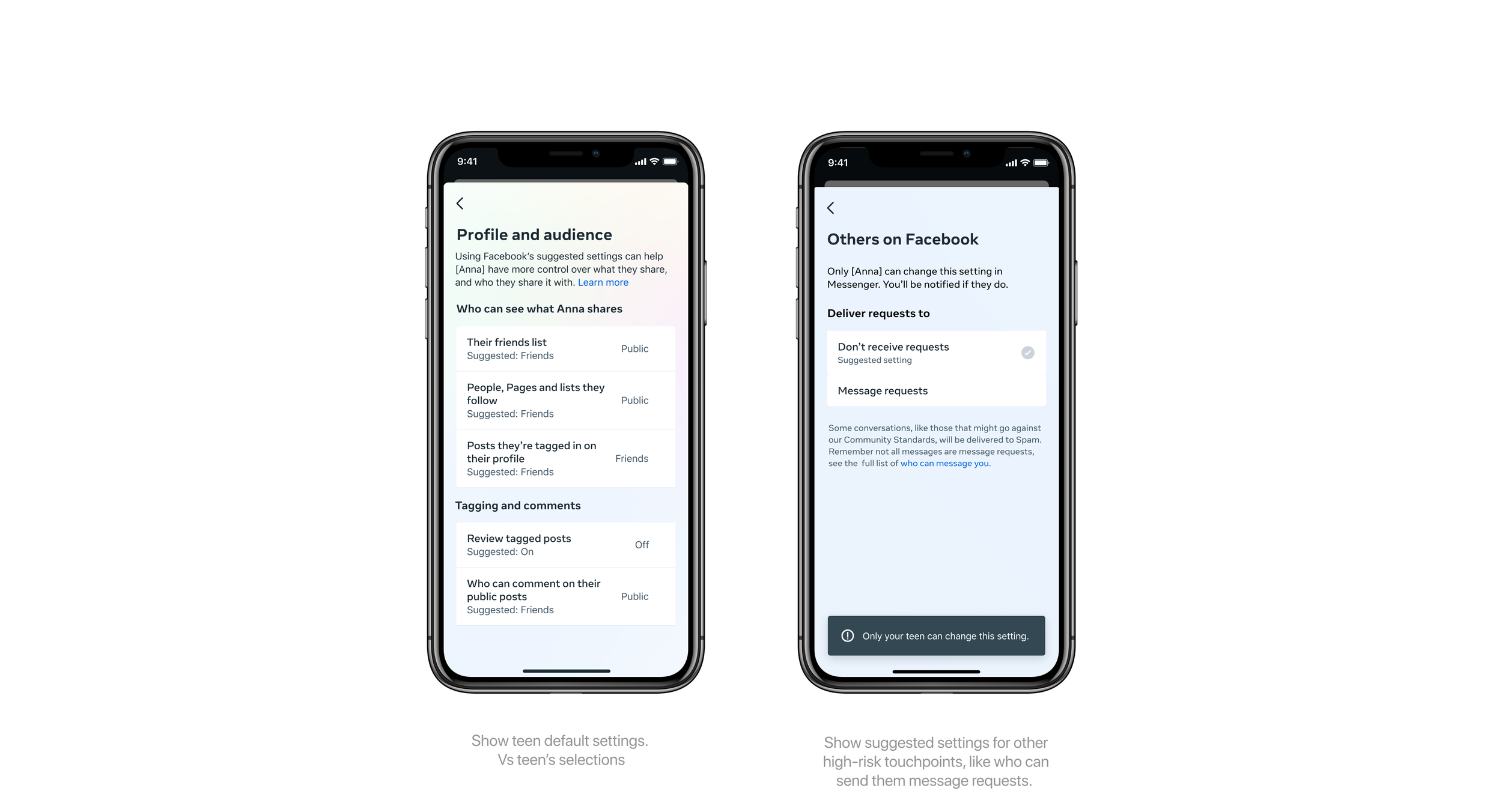
Settings recommendations / P0
Problem: Parents and teens may be unaware of our default privacy settings for teens, which minimize unwanted interactions and content exposure. Parents may also want visibility into the settings their teen has chosen, which is consistent with other supervision experiences.
Opportunity area: Raise awareness of our suggested settings to parents and highlight opportunities for teens to use safer settings.
Solution: Show default privacy settings in Family Center, alongside the teen’s selection for each setting.
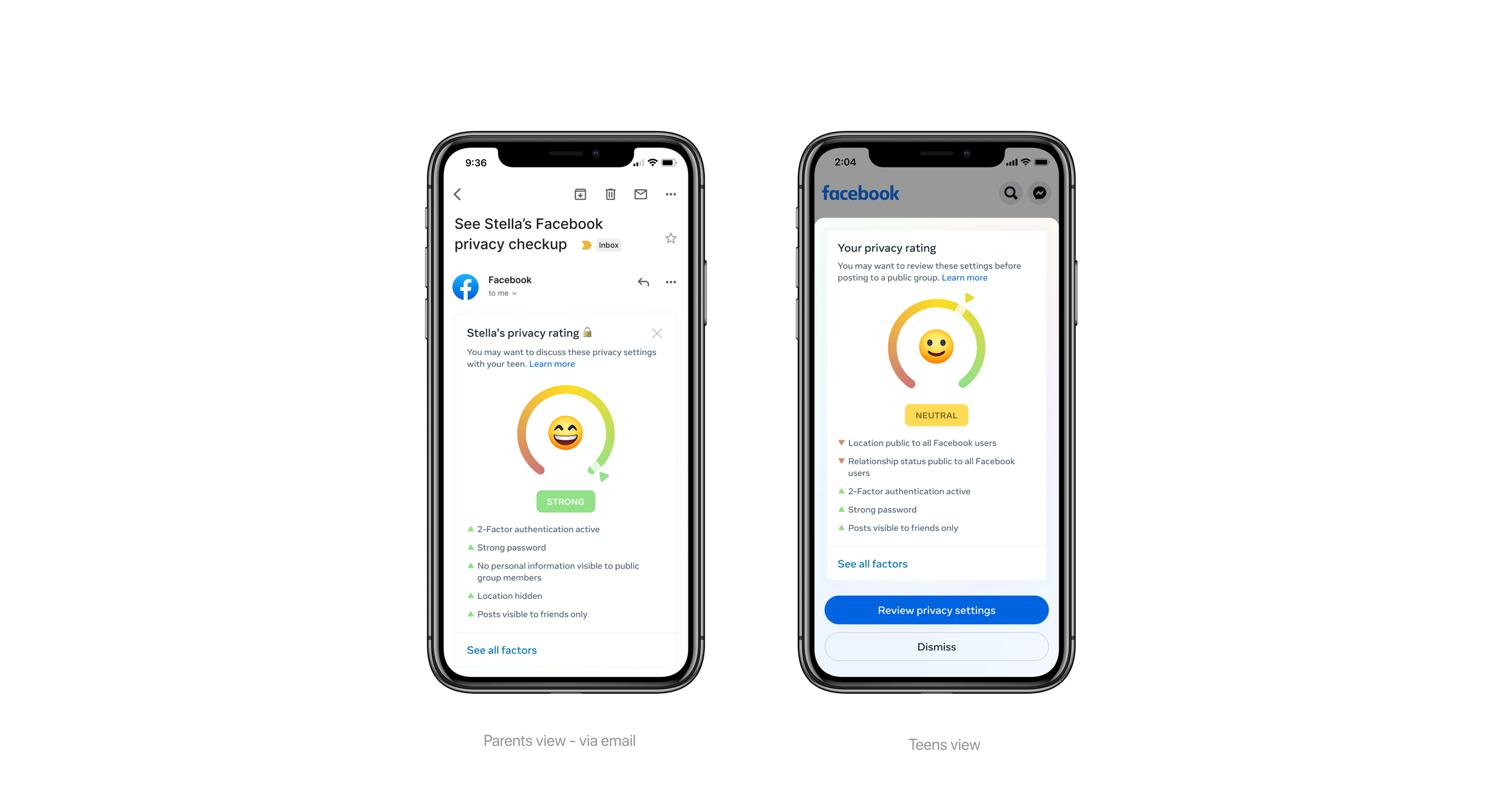
Privacy Rating / P1
Problem: Privacy settings can seem like an insurmountable configuration to address to people who haven’t visited the tool. They may not know what’s normal or what they should work towards.
Opportunity area: Privacy Checkup Expansion
Solution: Give explicit guidance on what marks are potentially disclosing too much, and nudge parents and teens to evaluate these settings at pivotal ‘first time’ moments in their Facebook experience.
Teen’s posts Insights / P1
Problem: Unwanted content expose problem for teens.
Opportunity area: User Insights
Solution: Teens will be given post insights and reminded of their privacy settings. Assist teens in avoiding further harm and provides the parents' side transparency.
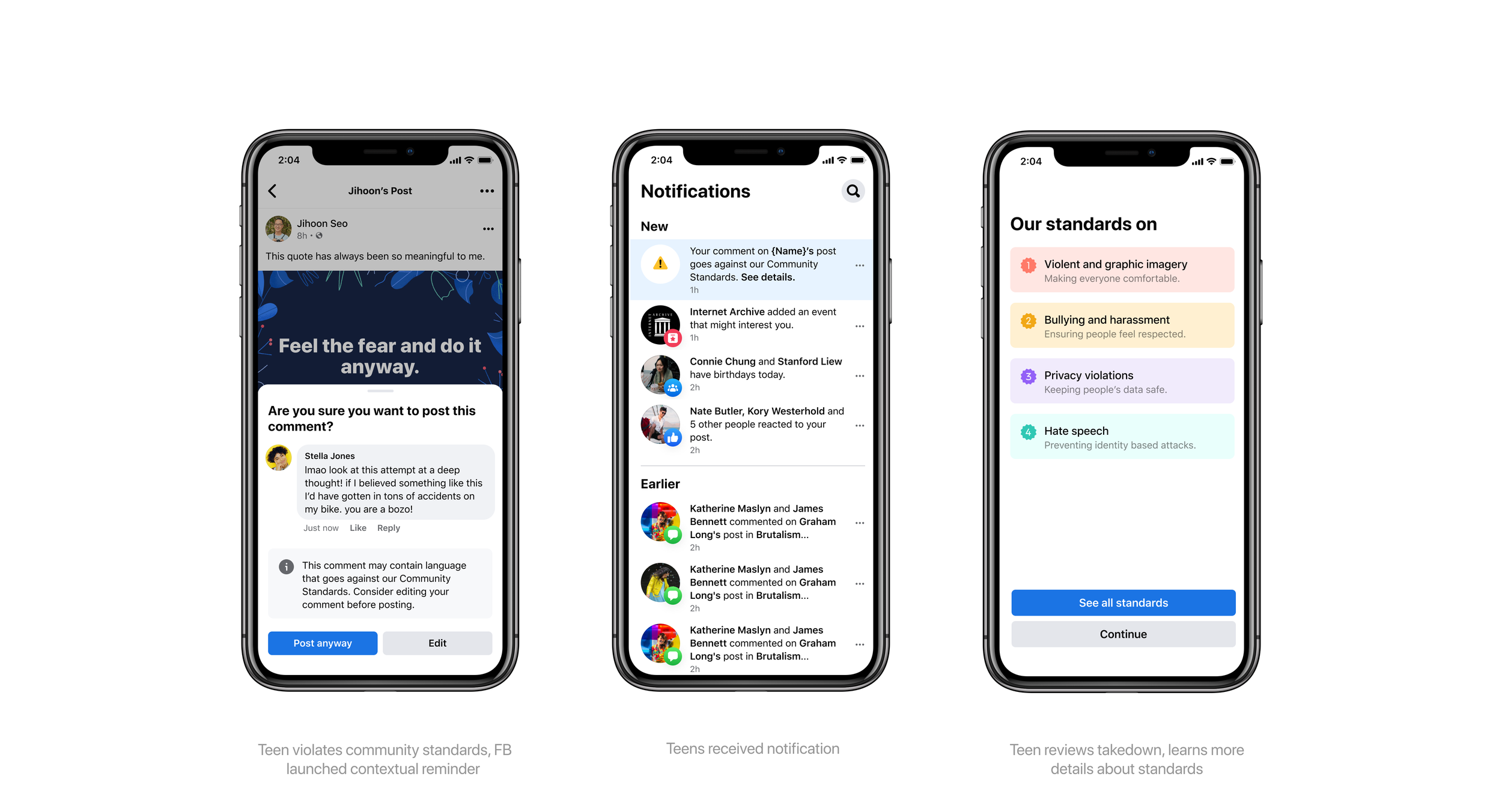
Trigger Community Standards Education / P2
Problem: Our community standards are often tucked away and not understood before engaging in activities on Facebook.
Opportunity area: Trigger education
Solution: Bring community standards education into the product experience in a way that prompts teen reflection and discussion between families.
Content Recommendation Reset / P2
Problem: Often people are intentionally or unintentionally drawn into rabbit holes or patterns of recommendations that can be harmful over time
Opportunity area: Sensitive content control
Solution: Give visibility into when this behavior might be forming, and provide corrective measures in the form of, Nudges, ‘New to you’ type content diversification and Resources for content evaluation
MVP Overview
Parents Experience: Focus on Family Center
The Family Center is the central area of the parent's side supervision experience. We are providing one place for parents able to gather enough data about their teens. Providing the right level of detail is the key. The intention is to promote conversation and find a solution as a family.
Teens Experience: Contextual & in the moment
For teenagers, Facebook supervision occurs frequently and in a more interesting setting when it is contextual.